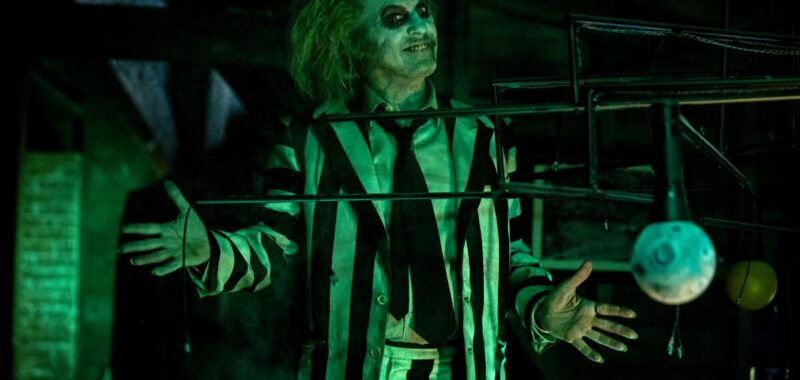Death is everywhere in Tim Burton’s long-awaited “Beetlejuice Beetlejuice.” Lydia Deetz (Winona Ryder) doesn’t need an invitation to wear all black, but a funeral brings her back to the original Ghost House, now with a sullen teen of her own, Astrid (Jenna Ortega). Not that Beetlejuice (Michael Keaton) is the grim reaper dressed in minimalist robes. Instead, the impish demon still sports a black-and-white suit, hoping to cause mischief in the world of the living and reconnect with his decades-long crush, Lydia.
“I had to figure out how the main characters looked first, how to make it feel good as the ‘Beetlejuice’ that everyone knows and loves, and still make it a new world of ‘Beetlejuice’ 30-some years later,” says costume designer Colleen Atwood.
A collaborator of Burton’s since “Edward Scissorhands,” four-time Oscar winner Atwood took the conceit of the signature stripes from the original 1988 movie (designed by Aggie Guerard Rodgers) and factored in the passing of time when constructing the custom-made Italian silk satin suit. “He’s been wearing it for 35 years, so it’s a bit more aged in a moldy, mildewy way. We did a little fake tummy to make him look a little bit middle-aged,” Atwood says. “Michael did a lot with the way he moved and walked; that changed up Beetlejuice too.”
Another question Atwood had to answer was, “Did he ever change [his clothes]?” Short answer: yes. The wedding burgundy rent-a-tux (complete with a ruffled shirt) references the original film. Beetlejuice dabbles in other goofy alternatives such as a matador outfit and an afterlife customs-officer uniform.
Another instance is when Beetlejuice plays with the fabric of reality after Lydia’s smarmy boyfriend, Rory (Justin Theroux), says “Beetlejuice” three times. Wearing a brown knit cardigan, Beetlejuice takes on the guise of a couples therapist. Lydia’s stomach swells as part of Beetlejuice’s mischievous manipulation, and her black-and-gray checkered dress has to accommodate this rapid growth before a baby Beetlejuice bursts out. “It was exciting for all of us, including Tim, to revisit that way of shooting, of making things work. That low-tech and in-camera version of doing stuff,” Atwood says.
For this scene, Atwood used an authentic handwoven Japanese fabric from a personal collection that she maintains on both sides of the Atlantic (“I have stashes of stuff because I hate to throw it away”). “I love the scale of the check. I thought it harked back to the original pinafore she wore in the first ‘Beetlejuice,’” says Atwood. With only a limited amount (Atwood acquired the material 15 years earlier), they used every inch to make multiples to accommodate the back-to-basics practical effects: “By the end, we were sewing the cut edges of the fabric together to get enough to make a whole fifth pinafore for her.”
Astrid’s bespoke sunflower frock came from Atwood’s treasure trove of materials, and there was no room for error. “I had just enough [fabric] for one dress,” says Atwood. Whereas Lydia favors “clothes enveloping her” as armor against the world, rebellious daughter Astrid “leaned into the ’90s grunge vibe.” Astrid pairs the girlish floral dress with a denim jacket and plaid shirt tied around her waist when hanging out with cute neighborhood boy Jeremy (Arthur Conti). “I love when some of my fabrics that I hoard come to play, and ‘Beetlejuice’ was good for two of them,” she says.
Not every sartorial solution came from Atwood’s archive or an actual store. Sometimes, you have to turn to an upholstery supplier. Take Beetlejuice’s Afterlife Call Center employees, known as the Shrinkers. When reading the script, Atwood had a light-bulb moment about the overall aesthetic: “I think his crew should look like Century 21 Real Estate guys from the ’70s.” Sourcing enough gold-colored material with sufficient structure for the blazer was challenging, but Atwood turned to couch textiles for a solution. “There were tons [available]. It was $3 a yard, super cheap,” she adds.
On the other end of the undead style spectrum is the vengeful bride, Delores (Monica Bellucci), dressed to kill in black. Atwood used myriad materials (including crin, typically used for hats; crepeline, a silk fabric backing; and patent leather) so “it would light in different ways when she moved.” Lydia also eschews white for her (reluctant) walk down the aisle in a tightly pleated red silk tulle and French lace Victoriana goth-influenced silhouette. “I wanted it to have that feeling of glowing a little bit. I like tulle because light can pass through if it’s lit,” says Atwood.
Another eye-catching turn-of-the-century-inspired frock is Astrid’s take on Marie Curie for Halloween. To ensure it stood out during night shoots, Atwood turned to a nylon and aluminum material she had previously used. “It’s beautiful fabric. It has no weight, but it almost has a glow at night,” she says. “I thought, for those in on the Marie Curie joke, that it was radioactive. It had that vibe without having LEDs running through it.”
Whether possessing the power to shine furniture or a fabric saved for more than a decade, Atwood found infinite possibilities in the materials used to create a closet fit for “Beetlejuice Beetlejuice’s” living and dead. “You can create fabric. You don’t have to accept just what’s on a bolt,” says Atwood. “You can make it your own, which is an important part of costume design.”

